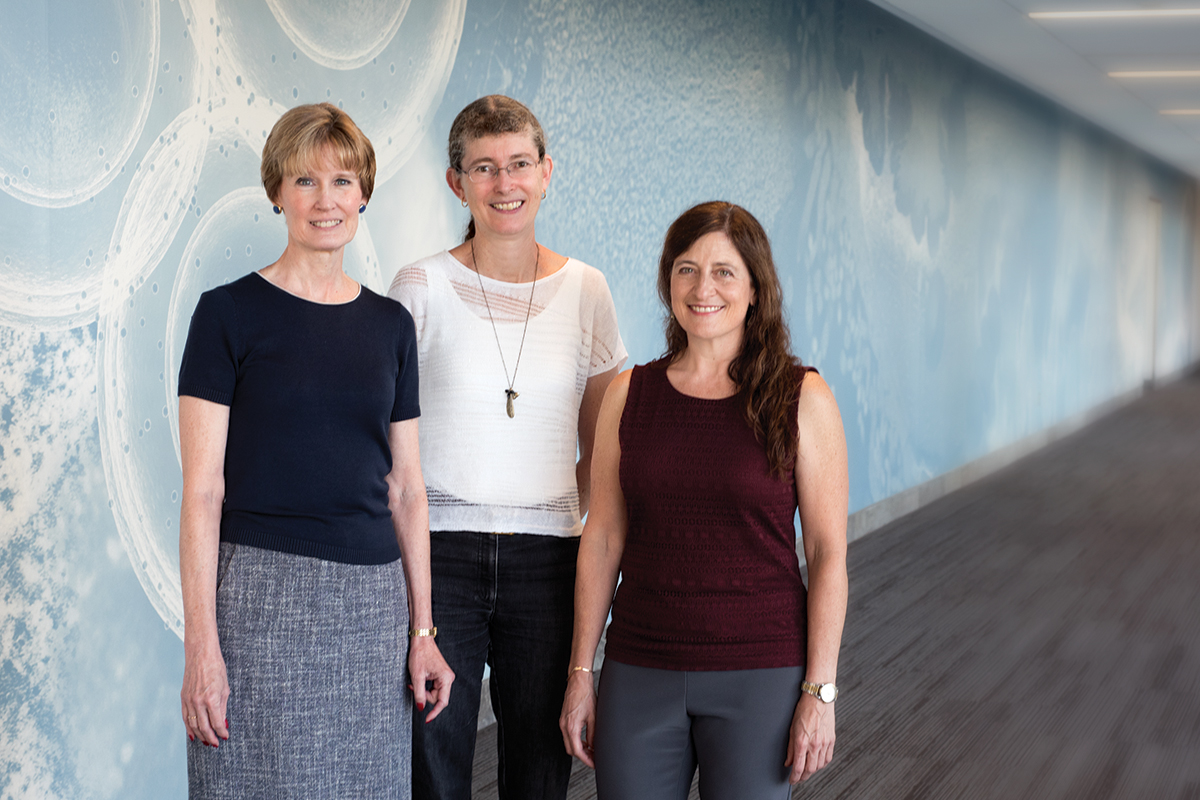
New endowed professors in basic science, from left, Linda J. Pike, PhD, Phyllis I. Hanson, MD, PhD, and Tamara L. Doering, MD, PhD.
School of Medicine investigators are harnessing new technologies to create precision and personalized approaches to diseases — advances that could not occur without prior investments in basic research.
“Basic research is a key driver of biomedical discovery and an essential part of the robust research environment at the School of Medicine,” said David H. Perlmutter, MD, executive vice chancellor for medical affairs and dean of the School of Medicine.
“Our university boasts a uniquely collaborative culture in which basic, clinical and translational scientists work together to explore some of the world’s most challenging medical problems,” he said.
In keeping with the medical school’s commitment to basic research, three outstanding women scientists recently were awarded endowed professorships. The funding will enable them to initiate promising research projects, while teaching the next generation of scientists and medical professionals. “Endowed professorships reward and honor those who do extraordinary work,” Perlmutter said.
The new endowed professors are:
Linda J. Pike, PhD, the Alumni Endowed Professor of Biochemistry and Molecular Biophysics
Phyllis I. Hanson, MD, PhD, the Gerty T. Cori Professor in the Department of Cell Biology and Physiology
Tamara L. Doering, MD, PhD, the Alumni Endowed Professor of Molecular Microbiology
The three awardees share a common passion for solving complex biological puzzles and are strong advocates for basic research.
“Essentially all of the progress made in the past 50 years in identifying new drugs has been a result of basic science research,” Pike said.
“In my own field of cancer research, in the last 30 years I have seen medicine go from having absolutely no understanding of what drives cancer to now having dozens of drugs that specifically target the many different proteins that drive cancers,” she added. “None of this would have been possible without the work of basic scientists.”

The three researchers focus on: (top to bottom) protein receptors, cell membrane pathways and pathogenic fungi.
Improving cancer outcomes
Pike is studying how cell-surface receptors in the tyrosine kinase family stimulate cell proliferation, a process that can result in breast, lung and other types of cancers. Tyrosine kinase-inhibiting drugs, which resulted from this type of work, are used by oncologists worldwide, and dramatically have improved outcomes for cancer patients. The insights provided by Pike’s work also may lead to additional targeted therapies.
Hanson agrees. “Most, if not all, diseases and disorders originate in problems or defects at the cellular and molecular level,” she said. “Understanding how cells and the molecules within them normally work is critical to understanding how diseases arise and how to treat these diseases.”
Like Pike, Hanson focuses on cellular function, investigating how other proteins interact to regulate the structure and organization of cell membranes both inside and outside the cell. Her work has clinical applications in cancer, neurodegenerative disease, including Alzheimer’s disease, and the debilitating movement disorder dystonia. Hanson is a member of the Hope Center for Neurological Disorders, and collaborates with scientists in neurology and ophthalmology.
Halting deadly infections
While Doering shares her colleagues’ fascination with the microscopic, her work focuses on one significant pathogen. She has devoted almost 20 years to studying the pathogenic yeast Cryptococcus neoformans. This microbe causes fungal meningitis, which has a devastating effect on immunocompromised individuals worldwide, and also causes disease in immunocompetent people. Doering is investigating a feature unique to the organism: its polysaccharide capsule, which plays a key role in the infection process. She has conducted biochemical and genetic studies to identify the cellular machinery involved in producing the capsule. Her work could lead to new medications to combat the deadly fungus, which are greatly needed, especially in resource-limited settings.
Women in leadership
The women acknowledge that it is a great honor to be named endowed professors. Hanson said she is thrilled and humbled to hold the professorship honoring the late Gerty T. Cori, a Washington University faculty member who, with husband and fellow faculty Carl Cori, also deceased, won the 1947 Nobel Prize for Physiology or Medicine for their work on cellular metabolism. “Gerty Cori exemplifies how a single-minded commitment to understanding a specific mechanism or set of mechanisms can have an extremely broad impact,” she said. “Carl and Gerty Cori’s accomplishments led to many applications downstream.”
The presence of women in leadership positions sends a strong message to talented young women considering science careers, said Pike and Doering.
“It is really important for young women to see that women who do good science are rewarded in the same way that men are,” said Pike, who co-founded the Academic Women’s Network (AWN) at the School of Medicine.
“Such awards are important not only for career development of the scientist, but also for raising the visibility of women researchers, which, in turn, helps provide role models for women trainees,” Doering added.
Published in the Winter 2016-17 issue


